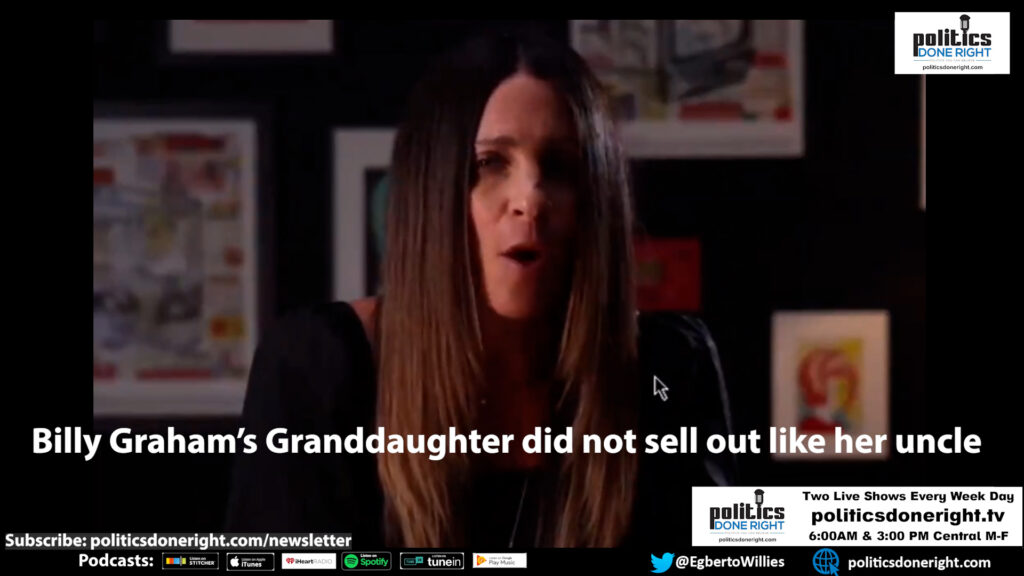Billy Graham’s granddaughter, Jerushah Duford, did not mince her words as she called out MAGA evangelical leaders who have sold their souls to Trump as she endorsed Kamala Harris.
Billy Graham’s granddaughter blasts MAGA.
Podcasts (Video — Audio)
The intersection of religion and politics has become increasingly fraught. The voice of Jerushah Duford, granddaughter of the renowned evangelical leader Billy Graham, resonates with a moral clarity that challenges the status quo of the evangelical community. Her recent decision to join the “Evangelicals for Harris” campaign represents a significant moment in the ongoing debate over the role of faith in American politics. Duford’s condemnation of Trump supporters, who have co-opted Christian values to justify the actions of a deeply flawed leader, signals a potential shift within a religious group that has long been a cornerstone of conservative political power.
Her voice highlights the deep sense of betrayal that many evangelicals feel as they witness their faith being used to support a man whose actions and words are antithetical to the teachings of Jesus Christ. Duford’s words, “various leaders of my faith then propped up this man as a poster boy for Godly manhood and leadership… This broke my heart,” echo the sentiments of a growing number of Christians who feel that their religious leaders have sacrificed their moral authority in exchange for political power.
Duford’s invocation of the biblical passage from Isaiah, which speaks of an oak tree whose leaves wither and a garden that goes without water, is a powerful metaphor for the slow erosion of Christian values within the evangelical community. As Duford notes, this erosion began with minor compromises—excuses made for unkindness and name-calling—and has now culminated in the justification of actions as egregious as assault and insurrection. The gradual moral decay she describes is not just a concern for the spiritual health of individual believers but for the witness of the evangelical church.
One of the most striking aspects of Duford’s speech is her emphasis on the responsibility of faith leaders to uphold the values of mercy, justice, and humility. By referencing Micah 6:8, a verse her grandfather often quoted, she reminds her audience that these are the core tenets of the Christian faith. Her call to action—urging Christians to pray, pledge their support to the “Evangelicals for Harris” campaign, and engage in acts of service—reflects a desire to reclaim the moral high ground many feel has been lost in recent years.
The creation of “Evangelicals for Harris” represents more than just a political endorsement; it is a movement that seeks to realign the evangelical community with the foundational principles of Christianity. By taking a stand against the pervasive influence of Trumpism within the church, Duford and others like her are challenging the notion that evangelicalism is synonymous with conservative politics. They call for a return to a faith prioritizing compassion, justice, and humility over political expediency.
This shift within the evangelical community is not happening in isolation. It is part of a broader trend of religious leaders and laypeople re-examining faith’s role in the public square. There is a growing recognition that prominent evangelical leaders’ endorsement of Trump has not only damaged the credibility of the church but also alienated many who were once curious about Jesus’s teachings.
Absent movements by different evangelical sects, the steady decline of the evangelical church would likely take them to extinction over the next few decades. Reverend William Barber, an evangelical leader & President of Repairers of the Breach, is one such leader.
Duford’s decision to publicly criticize Trump supporters and join the “Evangelicals for Harris” campaign is emblematic of a larger struggle within American Christianity. It is a struggle between those who believe that the church should be a prophetic voice, speaking truth to power and those who have chosen to align themselves with a political figure who embodies values opposed to Christ’s teachings.
Her words, “Voting, for me, is so much greater than policies; it’s a vote against another four years of faith leaders justifying the actions of a man who destroys the message Jesus came to spread,” encapsulate the core of this struggle. It is not merely a political decision but a moral one that will determine the future direction of the evangelical movement in America.
As more voices like Duford’s emerge, there is hope that the evangelical community will begin to move away from its suicidal and uncritical support of Trump and towards a more authentic expression of Christian faith. This shift could have profound implications for the future of American Christianity and the broader political landscape. The “snowball” of change may indeed be small now, but with each new voice that joins the movement, it has the potential to grow into a force that can restore the integrity of a faith that has been compromised for far too long.
Jerushah Duford’s courageous stand against the political co-opting of her faith is a call to action for all Christians who believe in the actual teachings of Jesus Christ. Her involvement with “Evangelicals for Harris” marks a significant moment in the ongoing struggle for the soul of American evangelicalism. As the movement gains momentum, it may reshape the relationship between religion and politics in the United States, leading to a more just, merciful, and humble society.

